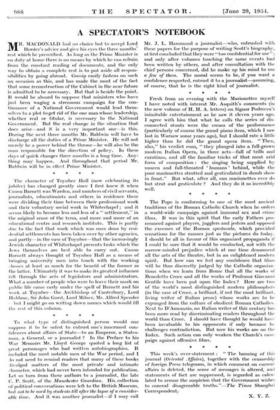The character of Toynbee Hall (now celebrating its jubilee) has
changed greatly since I first knew it when Canon Barnett was Warden, and numbers of civil servants, journalists, educationists and others in residence there were dividing their time between their professional work and their voluntary social work in Whitechapel ; and it seems likely to become less and less of a " settlement," in the original sense of the term, and more and more of an educational centre and research institute. This is partly due to the fact that work which was once done by resi- dential settlements has been taken over by other agencies, and partly—in the case of Toynbee—that the increasingly Jewish character of Whitechapel presents tasks which the Jews themselves arc best able to carry out. Canon Barnett always thought of Toynbee Hall as a means of bringing university men into touch with the working classes at least as much for the benefit of the former as the latter. Ultimately it was to make its greatest influence felt through the acts of legislators and administrators. What a number of people who were to leave their mark on public life came early under the spell of Barnett and his work at Toynbee—the Archbishop of Canterbury, Lord Haldane, Sir John Gorst, Lord Milner, Mr. Alfred Spender -- but I might go on writing down names which would fill the rest of this column.
*




































 Previous page
Previous page